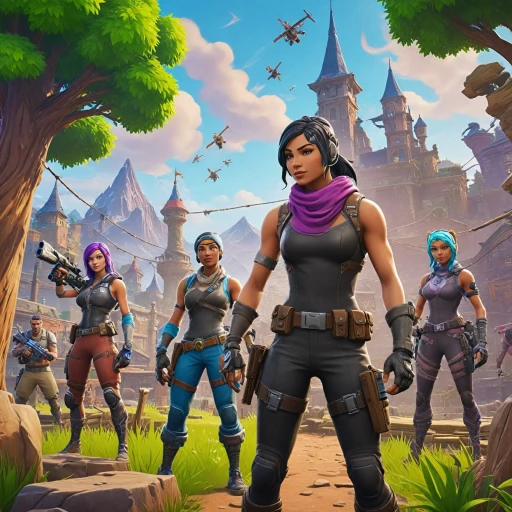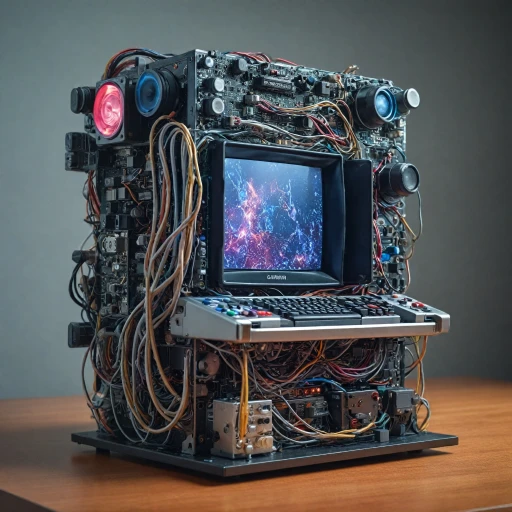
Understanding Network-Based Gaming
The Complexity of Game Worlds
Network-based gaming has reshaped the landscape of digital entertainment, transcending simple play to offer immersive and expansive universes where players from around the globe can connect. These games, driven by robust network infrastructures, allow individuals to explore vast digital domains whether it's a ship navigating through space in a game void or a crew working together in cooperative missions.
The Role of Community and Interaction
Central to these experiences is the interaction between players. A network of players, each contributing their own unique skills and strategies, can transform a seemingly straightforward game into a complex and dynamic network of gameplay. Platforms like Steam and services such as Valve Corporation facilitate this, enabling real-time communication and collaboration. Through these interactions, players contribute to an evolving community that extends beyond the digital world, manifesting in various channels like Facebook, Twitter, and even broadcasts support.
The Engagement and Various Game Genres
Network games offer a diverse bundle of genres and experiences, from competitive games that test a player’s skill to cooperative gameplay that emphasizes teamwork. Player engagement is enriched through the inclusion of comprehensive stats community features and game mechanics that adapt to players’ choices, creating a void network in which each game session can offer something new. Exploring these various modes of play expands the possibilities of what gaming can achieve.
The Evolution of Gaming Consoles
The Shift from Single to Network-Based Gameplay
The gaming landscape has evolved dramatically over the years, shifting from simple single-player games to complex network-based experiences. This transition has been marked by the rise of online platforms like Valve Corporation's Steam, which brought network gaming into the mainstream. These platforms enable players to connect, collaborate, and compete in a shared universe, fostering a vibrant community that thrives on interaction.
Advanced Game Mechanics and Player Interaction
The introduction of network-based gaming has brought significant advancements in game mechanics. These games often feature dynamic environments where players can influence each other's experiences, creating a more immersive space adventure. The "Void Crew," for instance, allows players to cooperate on space missions, illustrating how collaboration is integral to modern gameplay. This increase in interactivity and cooperation has expanded the skill sets required to excel in these games, as players need to strategize, communicate, and often replay scenarios to achieve their objectives.
The Influence of Broadcasting and Social Media
Broadcasts and social media platforms like Facebook and Twitter have played a pivotal role in the popularity of network-based games. Live broadcasts support real-time sharing of gameplay, allowing players to showcase their skills and connect with a global audience. Game developers often use these platforms to engage with their community, providing updates, stats, and exclusive content. This integration of social media and gaming has broadened the reach and engagement of network-based games, transforming them into a more inclusive and accessible entertainment form.
Increased Accessibility and Diversity in Gaming
Network gaming has also made the medium more accessible to a diverse audience. With a wide array of bundles and purchase options, players can easily buy and play games that appeal to their interests and skill levels. This increased accessibility has contributed to the growth of the gaming community, making it more inclusive and varied. Collaborative games like "Game Void" and "Void Network" showcase this diversity, offering different gameplay experiences that cater to a broad range of players.
A deeper understanding of the evolution of gaming consoles can provide insight into the immense growth and potential of network-based gaming in shaping the future of digital entertainment. For a closer look at the opportunities that lie within this sphere, consider visiting our blog on exclusive entry to esports events and how they captivate the modern gaming audience.
Key Features of Network Games
Essential Components of Networked Gameplay
In the expansive universe of gaming, network-based games have carved their own niche, offering players experiences that transcend geographic boundaries. As technology progresses, the key features of network gaming have emerged and continue to evolve, enhancing the overall player experience.- Connectivity and Multiplayer Interaction: At the core of network gaming lies the ability for players to connect with each other in real-time. This has been made possible by robust network infrastructures and the prevalence of high-speed internet. Networks such as the Void Network enable players to form teams, or 'void crew', providing a cooperative element that enhances gameplay.
- Statistics and Feedback: A crucial aspect of network games is the comprehensive feedback system. Platforms like Valve Corporation's Steam offer stats games and broadcasts support, providing players with real-time stats and game comparisons. This heightened awareness allows players to refine their skills and adapt their strategies during play.
- Community and Social Interaction: The community element is integral in network games. Platforms often encourage social interactions through features that let players share experiences across social media platforms like Facebook and Twitter. Online forums and game-specific communities provide spaces for players to exchange strategies and tips, building a cooperative environment.
- In-game Economies and Customization: Many games developed in the network setting include in-game economies where players can purchase bundles, equipment, or cosmetics. Customization options offer players a way to personalize their avatars and ships, creating a holistic space adventure and enriching their overall gameplay.
- Cross-platform Play: Increasingly, network games support cross-platform play, removing the barriers between different gaming consoles or platforms. Players enjoy the flexibility to play their favorite games with friends over different systems.
- Precision and Response: The game mechanics in network gaming are designed to offer precision and quick responses. This ensures that the void of delay does not mar the experience, keeping the atmosphere competitive and engaging.
Challenges in Network Gaming
Overcoming the Hurdles in Online Gaming
In the ever-evolving world of gaming, network games have transformed the way players interact and engage in virtual landscapes. However, the journey through the void network of connectivity isn't without its obstacles. As players navigate through digital realms, several challenges tend to arise, impacting the overall gameplay experience. Firstly, network stability poses a significant issue. Players often confront interruptions in their gaming experience due to unstable connections or bandwidth limitations. Such technical glitches can detract from the immersive world of a space adventure or intense battle scenarios, leading to frustration. The reliance on a stable internet connection is crucial for seamless play, especially when engaging with massive multiplayer online games on platforms like Steam. Another common hurdle is adaptability to game mechanics, which varies among different games within the community. Each game possesses unique gameplay and control schemes, requiring a keen ability to adapt quickly. For new players, the steep learning curves can be daunting, especially when they encounter more experienced peers in the game void. Moreover, the expansion of games and the multitude of platforms raise privacy concerns. With increasing community interaction and data exchange, players should be cautious while sharing personal information. It is essential to scrutinize a game's privacy policy to understand the extent of data collection and sharing. Game developers and publishers, like the well-known Valve Corporation, continually strive to enhance security measures to protect their players' data. Network games have also brought about a shift in the way players communicate and build communities. Social media platforms such as Facebook and Twitter have become prevalent in enhancing community broadcasts and fostering discussions about stats games. Nevertheless, players should be wary of "report abuse" features and ensure that any negative interactions within these online communities are addressed promptly. Despite these challenges, network-based gaming continues to be a thriving component of the modern entertainment landscape. With the increasing development and support for broadcasts, there is hope that players will find support and guidance in overcoming these hurdles, forging deeper connections in the gaming community. As technology and game design progress, one can anticipate improved connectivity and more engaging experiences, allowing players to fully immerse themselves in their chosen virtual worlds.The Impact of Network Games on the Gaming Community
The Influence of Network Games in Fostering a Community
Network-based games have redefined the gaming community, offering enriched experiences that were not possible years ago. With the advent of technologies like void networks and game mechanics crafted by industry giants like Valve Corporation, the community of players has expanded significantly, forming global connections that elevate the gameplay experience. The ability to connect with players worldwide through platforms such as Steam has created a shared space for the exchange of tips, game strategies, and even forming or joining a void crew for space adventures. These communities aren't just about playing games; they're about participating in a shared journey within the digital realm. ### Interactive Engagement Interactive engagement, often facilitated through social networks like Facebook and Twitter, enhances this community spirit. Players can reply to broadcasts, support each other's gameplay achievements, and even share stats in gaming circles. Facebook's integration allows for these experiences to be more than just a solitary play – it's a collective effort that builds camaraderie among players. These social facets of gaming have also encouraged a more participatory and inclusive environment. Players tend to skip content that is less engaging, but with meaningful network interactions and skill-based challenges, the community thrives on what's most fun and rewarding. ### Impact on Game Development and Marketing Developers are leveraging this community-driven dynamic to inform game development. By understanding game mechanics that captivate players and analyzing stats from community interactions, game developers can refine their offerings. As players continue to bundle their experiences with others, they provide a unique market insight that developers cannot ignore. Moreover, communities play a pivotal role in marketing strategies. A strong and engaged community can significantly boost a game’s visibility and appeal. Players often share their experiences and discoveries, which acts as organic marketing that reaches potential new players. From the privacy policy aspects to rights reserved content, these communities ensure that the players’ voices are heard, offering feedback that developers use to address concerns such as report abuse mechanisms and enhance user safety. In conclusion, the impact of network games on the gaming community is profound. It has not only propelled the evolution of gaming experiences but also forged a global tapestry of players who share common interests and joy in the world of gaming.Future Trends in Network Gaming
Emerging Waves in Network Gaming
The landscape of network gaming is continuously reshaping, giving rise to new trends and innovations. These changes aren't just about the tech; they're affecting the community, the gameplay, and the experience as a whole.- Enhanced Game Crews and Community: As players form more cohesive void-crews, the void-network becomes an essential part of building community ties. This sense of community is helping players connect over shared interests, ultimately fostering a more engaged and collaborative gaming environment.
- Advanced Gameplay Mechanics: The continuous evolution of game mechanics has refined how games void are played, offering more immersive experiences. Complexty and interactivity are at the forefront, providing players new ways to hone their skills and challenge themselves.
- Streaming and Broadcasting Support: Valve Corporation and similar entities have focused on enhancing broadcast features. This shift empowers players to share achievements on networks like Facebook and Twitter, increasing visibility and engagement within the community. Streamlining broadcasts support will further cement its role in connecting players and viewers.
- Strategic Game Bundling: Players now often encounter bundle choice, presenting unique opportunities to buy several games at once for a discounted price. This strategy not only boosts sales but allows players to explore a variety of gameplay styles and game mechanics.
- Social and Privacy Implications: With increased network interaction, understanding game privacy policies becomes crucial. Gamers must pay attention to how their data is used, thus reinforcing the importance of maintaining a strong privacy policy.
- Spaces for Skill Development: New network platforms are offering innovative ways for players to develop their skills. Engaging in dynamic skill-based challenges or collaborative missions in space adventure games pushes the boundaries of traditional gaming.













